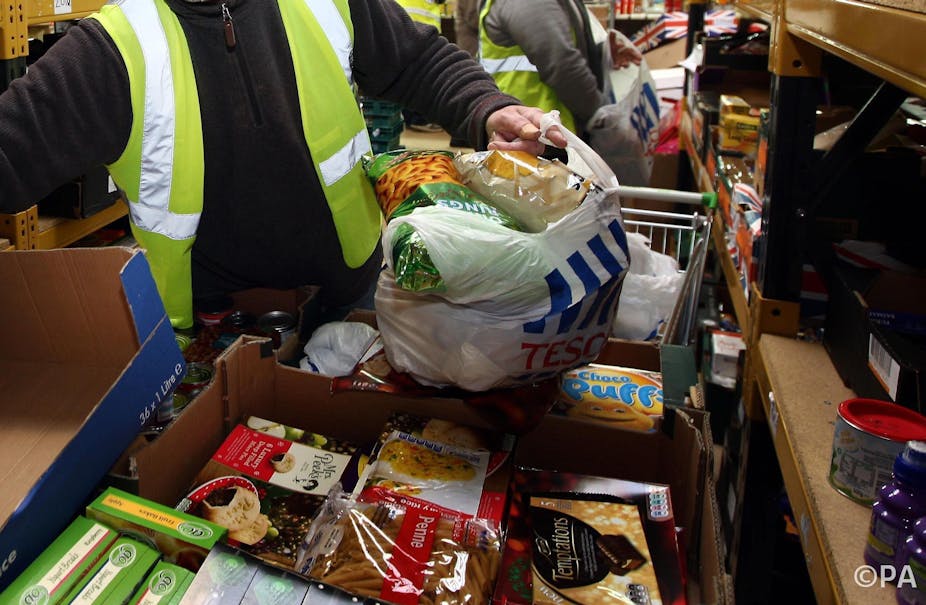Feeding Britain, a new report of the All-Party Parliamentary Inquiry into Hunger and Food Poverty, has been greeted with some fanfare. It details the full extent of the UK’s food poverty crisis and urges the government to confront the reality of the situation.
The report concludes that benefit delays, “rip-off merchants”, the decline of communities, debt and addiction all underpin the growth of the food bank phenomenon. It also highlights the high levels of food, fuel and housing inflation in the country. Shockingly, the evidence also suggests that 8% of adults cannot afford to eat properly.
And yet, the report makes no mention of another startling fact: that the UK in fact has an international legal obligation to uphold its citizens’ right to food. And by forgetting that this fundamental duty applies, we are storing up serious trouble for the future.
Talk of human rights has been strikingly absent from discussions on the UK’s food bank problem. So far, the various reports on the subject have failed to engage with, or even mention, the UK’s duties to ensure everyone is free from hunger.
The first official report on the rise of food banks, commissioned by the government department Defra, left human rights out altogether.
A subsequent submission from the UK to the relevant UN human rights committee meant to monitor how well the government is safeguarding its citizens’ rights, also neglected the UK’s right-to-food obligations: in the entire 47-page document on the UK’s human rights progress, the government fails to mention food banks, food poverty, or the proliferation of charities working in this area.
But the latest report, agreed by a cross-party group of MPs and backed by the Archbishop of Canterbury, has taken disregard of our human rights obligations to a new level.
Falling short
This is the most wide-ranging review of the issues and underlying causes of food poverty yet – and still, there is no acknowledgement of the UK’s legal obligations. Which, to be blunt, are not in any way ambiguous.
Human rights duties, despite being out of favour with some sections of the media, form a central part of the UK’s international legal obligations. Besides the much-maligned European Court of Human Rights, the UK is voluntarily bound by at least seven other human rights treaties at the United Nations.
One of these agreements, the International Covenant on Economic, Social and Cultural Rights, requires the UK to ensure individuals have a decent standard of living, and recognises the “fundamental right of everyone to be free from hunger”.
But this isn’t just a legal obligation: it’s also a well-tested template for how to handle food supply issues fairly and equitably.
The covenant’s terms require that countries ensure food is available (in sufficient quality and quantity), accessible (economically and physically) and acceptable (especially taking account of cultural practices and religious beliefs). This approach means social policy specialists, researchers and voluntary organisations all have a part to play. Food poverty, after all, isn’t just about calories – it’s also about security and dignity.

Because this is such a fundamental human right, a committee of experienced experts at the UN provides guidance on how to prioritise different responses to food poverty. In particular, that committee has noted the importance of prioritising the most vulnerable individuals during times of economic crisis.
Rotten record
Given the clarity of its obligations and the ready availability of guidance and oversight, the UK’s performance on the right to food has been remarkably poor. That there are approximately 1,500 food assistance projects in the UK and, given that more hunger undoubtedly exists beyond the reach of food aid providers, Britain is clearly falling far short of the acceptable standard.
Although food banks have filled a crucial gap, in their present form they simply cannot meet the full range of human rights standards.
There are real difficulties ensuring an even geographical distribution of food aid under the current system and, in many cases, people using food banks are unable to maintain their kosher, halal, vegetarian or vegan convictions. The weight of individual testimony in the Feeding Britain report illustrates just how stigmatised charitable “hand-outs” are – and this may be magnified where “second-hand” or waste food is distributed.
Another demonstration of the shortcomings of the current approach are the horror stories of financial checks on those wishing to use food banks. Such stories serve to highlight the inconsistent standards within the charitable food “sector”.
In other words, human rights standards have “dignity” at their core – and they demand more than a narrow “calorific” approach to food poverty.
Trouble ahead
All this bodes extremely poorly for the UK. The government has already endured international scrutiny of progress on housing rights, women’s rights and disabled rights. This persistent silence on the right to food and responses that completely neglect its obligations, set the UK on a collision course with yet another UN human rights body. In 2016 the government will be summoned to the UN in Geneva for its periodic review, to answer for its lack of progress. Once there, hiding from the right to food will no longer be an option.
It is of course to be celebrated that food poverty in the UK is finally getting the media and political attention it desperately needs. But if the proposed solutions are to have any chance of comprehensively tackling the problem – and if the UK is to fulfil its international obligations – much more needs to be done.
The obligations of the right to food must infuse the government’s responses to the food bank crisis. As long as these fundamental rights are ignored, things will continue to get worse.

